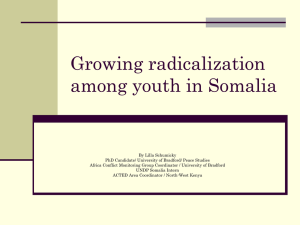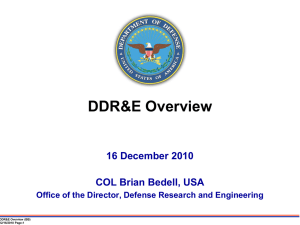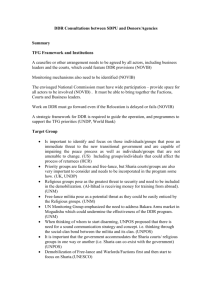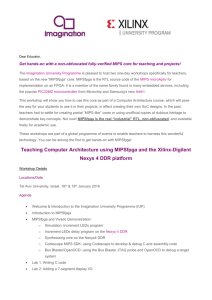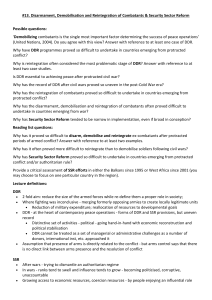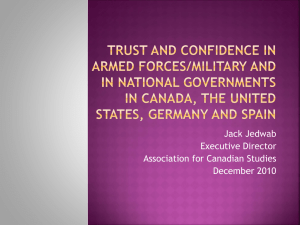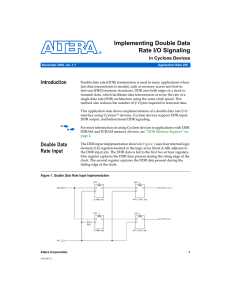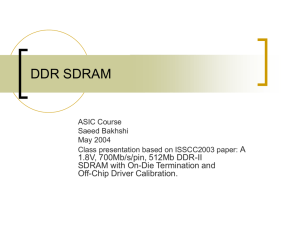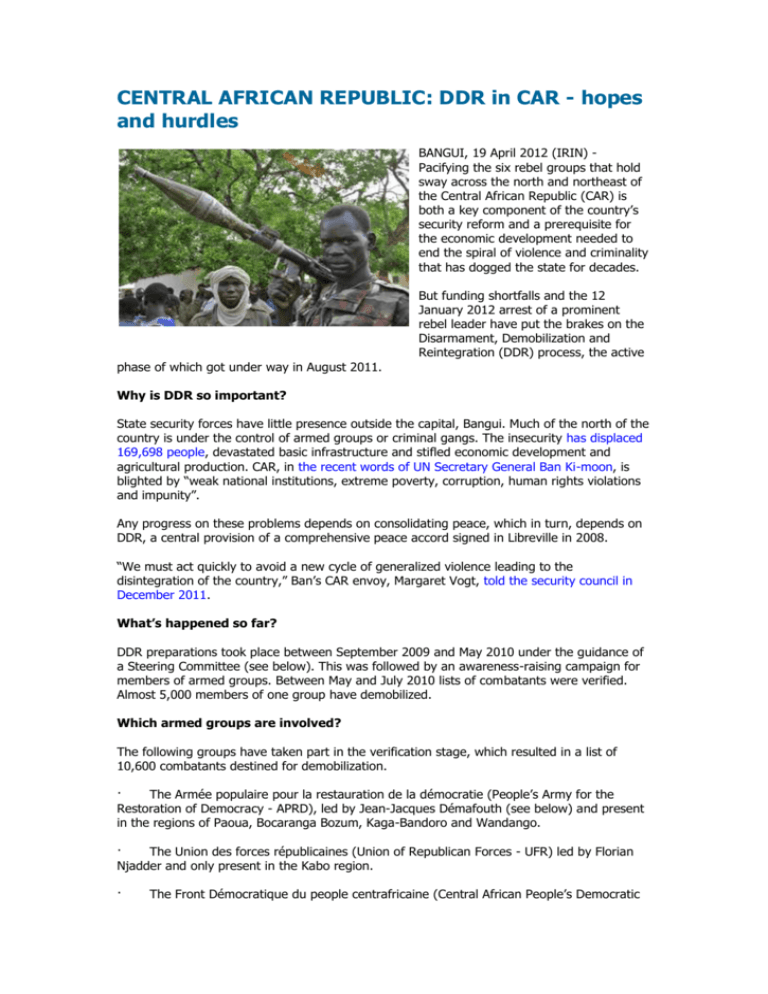
CENTRAL AFRICAN REPUBLIC: DDR in CAR - hopes
and hurdles
BANGUI, 19 April 2012 (IRIN) Pacifying the six rebel groups that hold
sway across the north and northeast of
the Central African Republic (CAR) is
both a key component of the country’s
security reform and a prerequisite for
the economic development needed to
end the spiral of violence and criminality
that has dogged the state for decades.
But funding shortfalls and the 12
January 2012 arrest of a prominent
rebel leader have put the brakes on the
Disarmament, Demobilization and
Reintegration (DDR) process, the active
phase of which got under way in August 2011.
Why is DDR so important?
State security forces have little presence outside the capital, Bangui. Much of the north of the
country is under the control of armed groups or criminal gangs. The insecurity has displaced
169,698 people, devastated basic infrastructure and stifled economic development and
agricultural production. CAR, in the recent words of UN Secretary General Ban Ki-moon, is
blighted by “weak national institutions, extreme poverty, corruption, human rights violations
and impunity”.
Any progress on these problems depends on consolidating peace, which in turn, depends on
DDR, a central provision of a comprehensive peace accord signed in Libreville in 2008.
“We must act quickly to avoid a new cycle of generalized violence leading to the
disintegration of the country,” Ban’s CAR envoy, Margaret Vogt, told the security council in
December 2011.
What’s happened so far?
DDR preparations took place between September 2009 and May 2010 under the guidance of
a Steering Committee (see below). This was followed by an awareness-raising campaign for
members of armed groups. Between May and July 2010 lists of combatants were verified.
Almost 5,000 members of one group have demobilized.
Which armed groups are involved?
The following groups have taken part in the verification stage, which resulted in a list of
10,600 combatants destined for demobilization.
·
The Armée populaire pour la restauration de la démocratie (People’s Army for the
Restoration of Democracy - APRD), led by Jean-Jacques Démafouth (see below) and present
in the regions of Paoua, Bocaranga Bozum, Kaga-Bandoro and Wandango.
·
The Union des forces républicaines (Union of Republican Forces - UFR) led by Florian
Njadder and only present in the Kabo region.
·
The Front Démocratique du people centrafricaine (Central African People’s Democratic
Front - FDPC) led by Abdoulaye Miskine and based in Kabo and Sido. The FDPC has recently
withdrawn from the DDR process and threatened to resume hostilities against the
government, accusing it of reneging on its peace deal commitments.
Only the APRD has actually progressed beyond verification, with 4,800 of its estimated 6,000
members demobilizing in Ouham Pende Prefecture. These former fighters are still waiting for
assistance to help them reintegrate into civilian life.
Which are not?
The following groups have not yet
entered the verification stage of DDR,
in large part because of lack of funds
to move the process forward:
·
The Union des forces pour le
rassemblement et la démocratie (Union
of Forces for Democracy and Unity UFDR), led by Zakaria Damane with
around 4,000 fighters.
Photo: Anthony Morland/IRIN
·
The Mouvement des libérateurs
centrafricains pour la justice
(Movement of Central African
Liberators for Justice - MLCJ) led by Abakar Sabone and based in Birao, with around 2,000
fighters.
Yearning for peace: conflict has devastated much of
northern CAR
·
The Convention des patriotes pour la justice et al paix (Patriots Convention for Justice
and Peace - CPJP) has about 2,500 fighters in the regions of Ndélé and Bria. It signed a
ceasefire in June 2011 and is involved in negotiations with the government but - uniquely
among the country’s armed groups - has yet to sign up to the comprehensive peace accord
drawn up in Libreville. This group clashed with the UFDR in Haute-Kotto and Vakanga
provinces in September 2011.
The following two armed groups are foreign, and so not involved in DDR, but their presence
in CAR poses a threat to security and therefore, in the absence of effective government
forces, a disincentive for other groups to disarm:
·
The Front populaire pour le rédressement (People’s Front for Recovery - FPR) is a
group from neighboring Chad present in CAR since 2008 and which in January 2012 clashed
with the FDPC .
·
The Lord’s Resistance Army (LRA) consisting of a few hundred remnants of a Ugandan
insurgency which began in the mid 1980s.
Who else is involved?
The DDR Steering Committee is made up of representatives of the government, armed
groups, the UN, the African Union, the European Union, France, the World Bank and
MICOPAX (Mission for the Consolidation of Peace in CAR).
Chiefly, time, money and Démafouth’s arrest.
“Further delays will only exacerbate tensions and compromise an already fragile process,
with potentially disastrous consequences,” warned Ban, who added that the onset of rains in
June will make it hard to advance DDR in the northwest.
In December 2011 CAR President Francois Bozizé said: "The DDR coffers are empty - a
situation that requires further negotiations with our financial partners to replenish the fund."
Vogt said the same thing a few months earlier at a UN Security Council meeting: "The
government needs US$3 million to complete the disarmament programme across the country
and $19 million for its reintegration programme."
Echoing her, CAR Prime Minister Faustin Archange Touadera, also present at the meeting,
said: "This lack of funding could wipe out all efforts to date."
Why was Démafouth arrested?
Justice Minister and government spokesman Firmin Feindiro accused the APRD leader of
trying to destabilize the government. He was arrested together with UFDR members
Mahamat Abrass, a former member of parliament for Birao, and Abdel Kader Kalil. A month
after his arrest Démafouth was charged with endangering state security. He was released on
bail after being detained for three months.
Why does it matter?
Days after the arrest, the DDR Steering Committee, of which Démafouth was the first vicechairman, warned the development would block the DDR process. Vogt echoed this in a 25
January statement, saying it could “jeopardize the efforts already made and those that
should be undertaken to consolidate a process that remains very fragile in the country… The
will of the Steering Committee is that DDR continue as originally planned across the country
to help consolidate a permanent peace throughout the national territory."
The Steering Committee remains inactive; other leaders of armed groups rejected the
government’s proposal to appoint one of their number to succeed Démafouth and his
position on the committee remains vacant.
Copyright © IRIN 2012. All rights reserved. This material comes to you via IRIN, the humanitarian news
and analysis service of the UN Office for the Coordination of Humanitarian Affairs.





